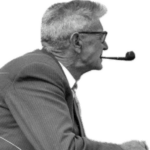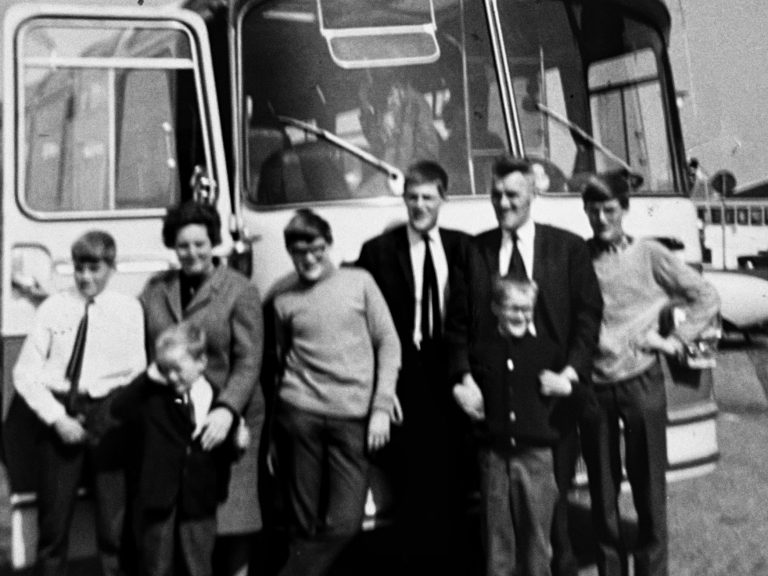Introduction
While cleaning up the website, I came across the story of Alex Berry about his grandfather Hendrik Schoonveld. Hendrik emigrated to America as a child. I have that story too! Below are my own memories, letters to and from my parents, and memories from my brothers Koos and Hans, written on the occasion of my parents’ 50th wedding anniversary in 1998.
Pasfoto
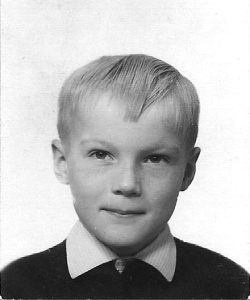
On a Saturday in autumn 1966, I, 8 years old, wanted to play outside with my friends. But that wasn’t possible. I had to go to the city with Dad, to Foto Steenmeijer on Herestraat. We needed to get passport photos taken. In the photo, you can see a somewhat angry boy. “You will be going on a long journey,” said the photographer. Strange. I didn’t think the trip from Helpman to downtown Groningen was really long. After we got home, Dad pulled me aside and told me that we would be moving to America.
My brother Koos writes about it: “The decision and preparations for this began in 1966 when Dad went to the USA with Uncle Klaas van der Sluis. Dad had discovered a land of milk and honey and couldn’t be stopped.” Dad and Mom had previously made plans to emigrate in 1959, but that didn’t happen at the time.
In a letter dated November 2, 1969, Aly Olthof, (Moe’s employer in Zuidwolde and a lifelong friend, who emigrated to Canada in the early 1950’s) writes about this:
When you think back on everything, you start to wonder why it had to be that way, first in Holland, then a big gap where we were here and you were there. When your plans to emigrate came about, this was reconsidered, yet it happened, and how happy you were that it finally went through, which we could hardly believe.
SS Statendam
The journey to America was an adventure. We were taken by bus to Rotterdam by many uncles, aunts, and cousins. A week-long trip to New York on the SS Statendam with stops in Le Havre, Southampton, Cork, and Halifax. Along the way, I got seasick. Since then, I’ve sailed on small and large boats in rough seas, never getting seasick again. Now that I have read Grandpa Willem’s story, I understand it. In the Atlantic Ocean west of Ireland, several currents converge, causing strange swells.
I slept with two of my brothers, Hans and Piet, in our own cabin. Our cabin had a bathtub. The ship had a swimming pool, a library, and a cinema. We were pampered and treated better than we ever imagined. One evening, I sneaked off to the Bingo night. To my parents’ surprise, who thought I was asleep, I was called up to spin the Bingo wheel.
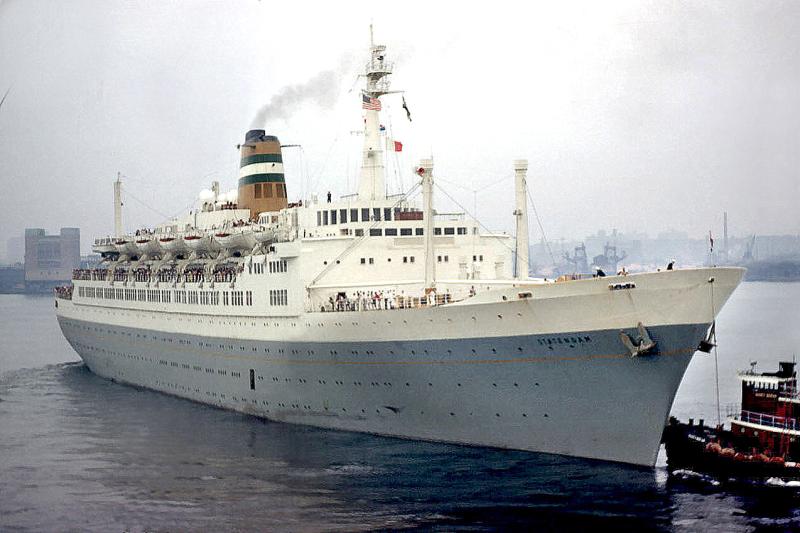
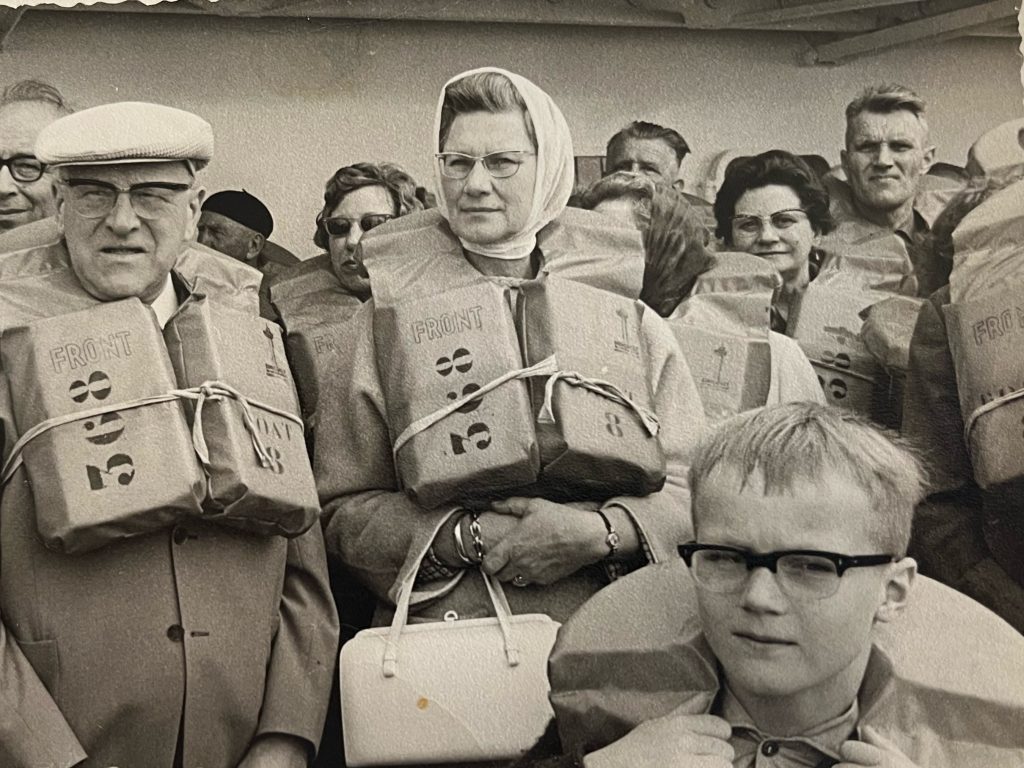
New York

We arrived early on a Sunday morning in New York, passing by the Statue of Liberty. From New York, we had to head to Michigan. The train wouldn’t leave until the evening from the Hoboken station of Erie Lackawanna. We spent the entire Sunday in the waiting area.
My older brothers went into the city. Koos writes about it: “The oldest three boys couldn’t be held back any longer, and after much nagging, we finally got permission to take a little look at the biggest city in the world. New York was a big disappointment for us. We traveled around the city a bit on the subway. Every time we emerged above ground at an unfamiliar station, we found ourselves in some kind of ‘ghetto’ and began to fear that our parents had taken us to a land of ‘ghettos’. How we finally made it safely back to the station remains a big question. After a long wait, the train finally departed.”
Hamburger
Keith: “It was during our trip to New York that we were introduced to our first ‘hamburger.’ We were walking as the only white boys in a rough neighborhood when we saw something familiar: a Heineken sign at a small pub. When we nervously entered, the black patrons fell silent. They looked at us in utter disbelief. But this was not enough to change our minds. We sat down a bit uneasily. When asked to order in English, panic set in again. None of us had any idea what to order. Piet, being the oldest and the most ‘worldly,’ ordered each of us a hamburger, thinking we had completed our task. But when asked what we wanted on it, panic struck again: what could go on a hamburger? Piet took the lead once more, decided to play it safe, and ordered it with ‘nothing’ on it. After we finished our dry and tasteless hamburgers, we wondered how those silly Americans could actually enjoy them.
Traintrip
Koos describes the journey. “Once underway, it didn’t take long for us to realize that traveling in America shouldn’t be done by train. We often found ourselves stopped more than moving, and when the train did get going, it rarely moved faster than a bike. It was a time of great impatience and boredom. Only when Uncle Klaas and Uncle Auke finally rescued us from the trip did it come to an end. They brought the whole family to the destination in the middle of the night.”
Jamestown
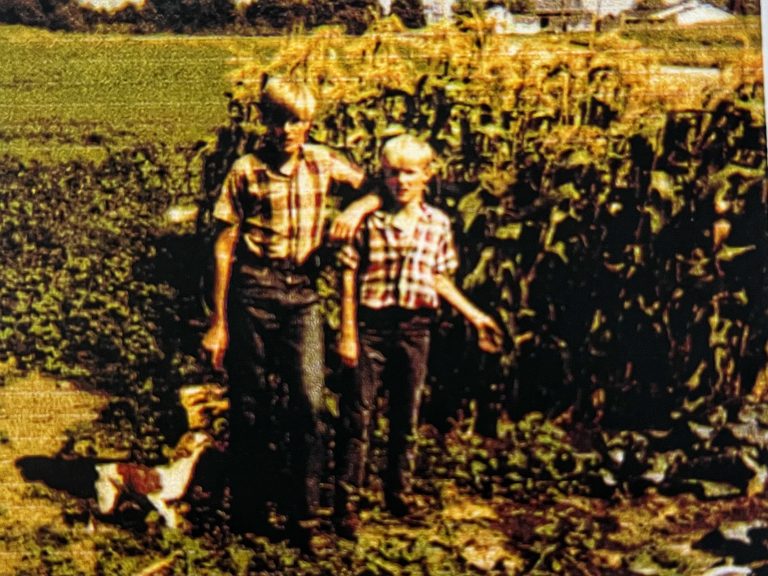
We moved into the house by the farm that Uncle Klaas had bought in Jamestown. Hans: “In Jamestown, we came to live on a large farm, what space and freedom. A big garden had to be created, Dad’s pride but for us boys mandatory weeding. Animals were acquired, starting with chickens, calves, to pigs, a horse, and of course a dog. The summers were long and hot, and the winters cold with plenty of snow.”
Everything was new and a strange language. It was late April. The school vacation in America lasts three months. For us, it wasn’t worth it to go to school before the long summer break. Therefore, it was a long, boring, and hot summer. Dad started working with Uncle Klaas.
School

The Christian elementary school was located in Hudsonville, about 10 kilometers from our house. We were picked up and dropped off by the school bus. The school bus had both Christian and public school children together. After the summer, I quickly felt at home in the school. I had no fond memories of the Savorin Lohmanschool in Helpman, also having an unpleasant teacher in my last year. The school in America was a breath of fresh air. Less strict and disciplined, and less hierarchical. We did recite our “Pledge of Allegiance” daily.
Quite lazy
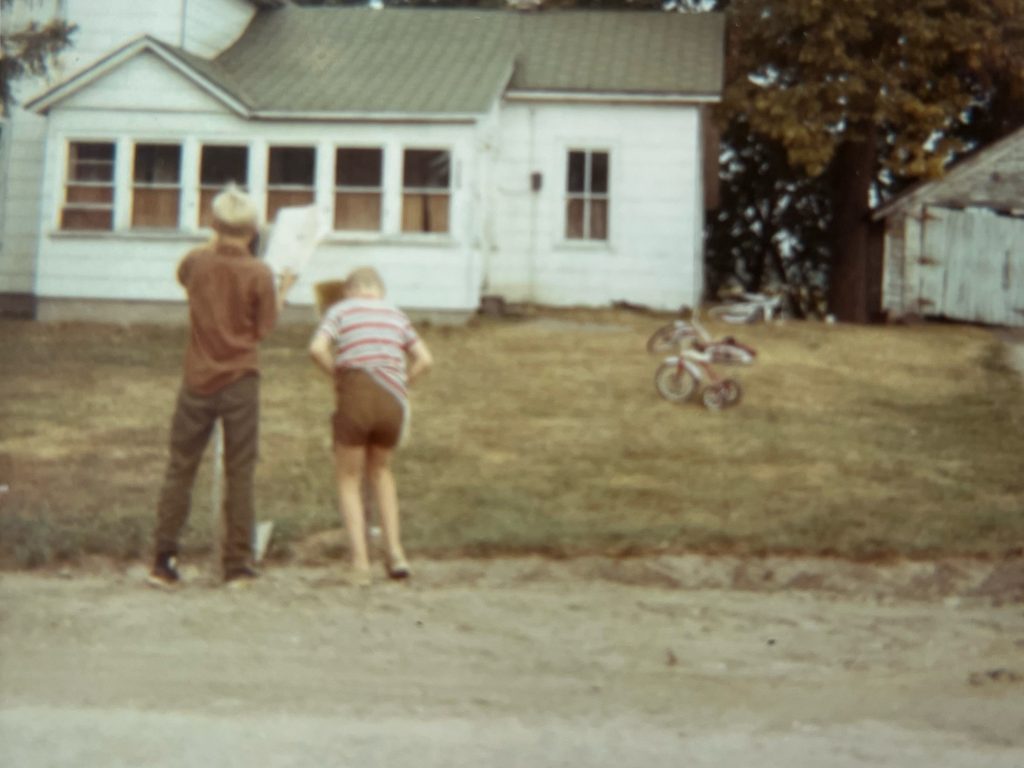
Once settled in, the following long summer vacations were also quite manageable. I remember helping with the hay, driving the tractor. We entertained ourselves in the park or in the village, one and a half kilometers from our house. Jamestown still had a grocery store, a hardware dstore, a bank, a barber, and two garages back then. I often sat with my friend Bruce at barber Nelson de Kock. In the last year, Bruce and I got a paper route in Jamestown.
My father writes about this in a letter to Moe on June 8, 1969: Rudie started his paper route on Monday full of courage, feeling like a real guy. At home, however, I have noticed he’s quite lazy.
Bruce 2025: I loved reading your blog – to confirm – you were not a LAZY kid. Those paper route bags were heavy and on a bike it was not an easy ride every day except Sunday (of course).
Office guy
But that beautiful time came to an end. Working for Uncle Klaas was not easy for Dad for several reasons. He worked in construction and as Uncle Harke says: “Jo was an office kid. As a teenager, he had a severe pneumonia. He never fully recovered.” As Christan Reformed members, you sent your children to the (non-subsidized) Christian school. With 6 school-going children, it was a heavy burden. Harke visited America and noted that Dad was “not going to survive.” He advised Dad to ask if he could return to his office job at the PTT. At that time, Grandpa and Grandma, Mom’s parents, were celebrating their 50th wedding anniversary. Grandpa was terminally ill. Mom took a 3-week vacation to the Netherlands.
Uncle Harm in a letter dated May 27, 1969, to Jo and the boys:
Fokje wants to attend church in Helpman on Sunday. Who knows, maybe she will miss Helpman once she returns. But judging by Ynke’s stories, Fran is quite content living in America, so still a lot that needs to change, by the way.
Cut
Tillema once remarked that he would pay a considerable sum if you all came back. You can see that besides your family, you also have genuine friends on this side. We hope Fokje really feels that, although I completely understand that it will be very difficult for her to say goodbye to America. I believe that the three weeks she is in the Netherlands could be decisive for her decision on whether or not to return. You might not want to believe it, but this is the topic of conversation among siblings. Yesterday, Harke and Elly were with us, and we had everything arranged: housing, jobs, ideally close to the house, preferably in Groningen, as that is easier for us, and then you can attend birthdays, etc.
In the letters that Pa wrote to Moe, he spoke about going back.
Pa on June 8, 1969:
I was quite annoyed when I read that Siebe was back at your place chatting about how I had written to PTT. Harke didn’t need to make that public right away either.
Jo to Fokje on June 1, 1969:
Harm’s letter was again a plea to return, but, he wrote, Ynske didn’t believe that Fokje was very eager based on the stories she told about America. You’re not bragging too much, are you, Mom? Otherwise, it sounds like I want to leave Paradise for some kind of backwater country.
Mrs. Olthoff writes in early November 1969:
It will, for you (although familiar), still be strange to adapt to everything again. It’s so very different, but the worst part is that you came as a whole and now return divided.
And now there will be much to arrange and still auction day? We can hardly believe this is reality. And we also find it very unfortunate that it has to be this way, as that wasn’t the intention at all. We must say that you are acting wisely in our opinion now that you had to make this decision, but it won’t come without struggle and heartache. You don’t regret going to America, and of course, you’ve gained a lot of experience, beautiful, but also difficult, especially at the beginning; one has this and another that, but emigrating brings everything with it, from all sides, and we have to experience it all for ourselves, as each person experiences it differently.
Back to Holland
The response from the PTT came in a letter dated September 9, 1969. Dad could return to the PTT in Zwolle. They decided to go back to the Netherlands. Piet was already in service, Koos and Wim did not want to return to the Netherlands. Koos stayed, but Wim was only 16 and had to come along. A year later he went back to America again. Hans, Alex, and I also had to come back, we were not asked anything. Koos writes: A few years later, the family returned to the Netherlands without the two oldest sons. Piet and I were 18 and 20 years old and were planning to stay in America while Piet was caught up in the crazy war in Vietnam. It was a kind of deserted time for me after growing up for all those years with the reassuring idea that your parents were always nearby to make everything right again.
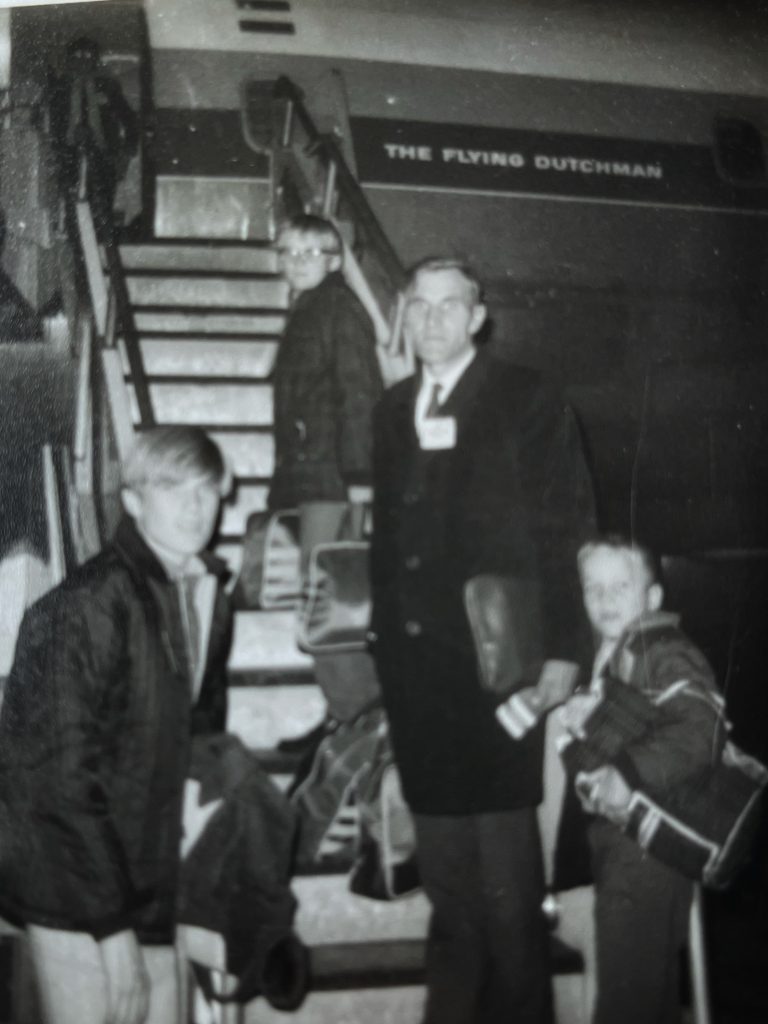
This time we returned by plane. On November 29, 1969, we were greeted at Schiphol by various uncles and aunts and cousins.

Tears
Mom’s Dad passed away the week before our return. Mom immediately went to her mother with Alex. I stayed with Dad at Uncle Harke and Aunt Elly’s house. It was Aunt Elly’s birthday that day. I took a nap in the afternoon, and when I came into the living room in the evening, all the Uncles and Aunts were there. I remember getting tears in my eyes from the blue smoke that hung in the room. But also because I really didn’t want to be there.
Our house in Zwolle wasn’t ready when we arrived. I stayed with Uncle Jack and Aunt Sien for a week. I celebrated Sinterklaas there. I still have my Sinterklaas gift, “Scheepsmaat Woeltje in the bookcase.
Uncle Siebe told me that we got an apartment in Zwolle with a view of the IJssel. Actually we had a view over the expressway and the ring road of Zwolle.
My first school day felt like a cold shower again. The class was divided into boys’ and girls’ groups, based on the levels of the high school we would be going to. The boy sitting next to me, with a trembling voice, told the teacher, Mr. Th. Van Dijk, that he hadn’t done his homework. The boy on the other side quickly explained to me that I had to speak in two words.
The well-being of Dad in America and the Netherlands went over my head as a child. In April 1970, the American Annie van Dis visited Zwolle. Her friend wrote about it, Annie says that Jo looks much better than I thought, he doesn’t miss America much.
After my final exams, I spent 7 weeks in America, partly to see if I saw my future there. I got my driver’s license there. My future was then in the Netherlands; I would study in Groningen. Not enough reason to go back to America after all, too little perseverance, a lazy kid?
Discover more from Schoonveld Family
Subscribe to get the latest posts sent to your email.
